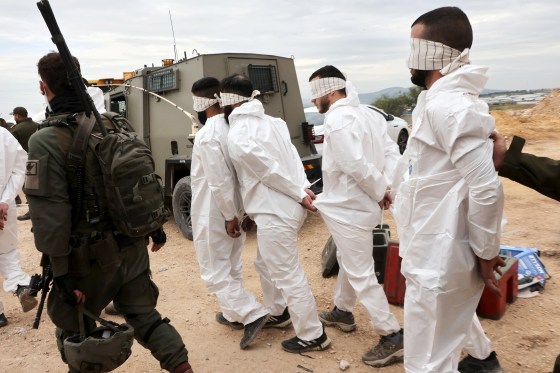
A massive operation in Jenin, which the military said was intended to target Iranian-backed extremist organizations in the unstable West Bank city, continued Wednesday, while Israel’s defense minister stated that soldiers were putting lessons learned in Gaza to use.
The operation was comparatively similar, but in a lesser area, to one that took place in August when hundreds of Israeli troops, supported by drones and helicopters, raided Jenin and other flashpoint cities in the occupied West Bank, according to a military spokesperson who declined to provide specifics.
In less than two years, the Israeli army has made three significant incursions into Jenin, a long-standing key bastion of militant groups like Hamas and Islamic Jihad, which claimed their men were engaged in combat with Israeli troops.
After ten people were killed the day before, residents reported continuous shooting and explosives, while Palestinian health services reported at least four wounded.
The operation, which included armored bulldozers to demolish roadways in the refugee camp next to the city, was specifically focused on the terrorists’ growing use of roadside bombs and other improvised explosive devices, according to Israeli military spokeswoman Nadav Shoshani.
Many Palestinians abandoned the camp, a densely populated township for descendants of Palestinians who were forced from their homes during the 1948 conflict surrounding the founding of Israel, while the operation went on.
A woman who identified herself as Um Mohammad said, “Thank God, we were at home. We went out and asked an ambulance to take us out.”
Roadblocks and checkpoints had been set up throughout the West Bank before to the raid, which took place two weeks after a shooting attack that Israel blamed on Jenin-based terrorists, in an attempt to slow down movement throughout the region.
Following a weeks-long campaign to try to regain control of the refugee camp, which is dominated by Palestinian factions antagonistic to the PA, which has limited authority in areas of the West Bank, Palestinian Authority (PA) security forces withdrew as the raid got underway.
Israeli troops were withdrawing from their posts in several parts of the enclave just two days prior to the operation, which coincided with the signing of a ceasefire agreement in Gaza and the exchange of hostages for Palestinian detainees detained in Israeli prisons.
The military said on Wednesday that troops in several parts of Gaza fired warning shots at masked people who approached them and engaged several armed suspects it claimed posed a threat. It urged Palestinians to stay away from the forces.
In a statement, the IDF stated that it was ready for any situation and would take all necessary steps to counter threats, and that it is committed to upholding the conditions of the agreement in order to return the captives.
According to Defense Minister Israel Katzs, the Jenin raid was the first lesson learned from the strategy of conducting frequent raids in Gaza and signaled a change in the military’s security strategy in the West Bank.
In a statement, he declared, “We will not permit the weapons of the Iranian regime and radical Sunni Islam to threaten the lives of [Israeli] settlers [in the West Bank] and create a terrorist front east of the state of Israel.”
After 15 months of shelling, Israel’s campaign in Gaza has left much of the coastal enclave in ruins since Hamas-led terrorists attacked Israel on October 7, 2023. Although the military has stated that it has improved its urban warfare strategies based on its experience in Gaza, Shoshani would not elaborate on how these lessons were being implemented in Jenin.
Israel views Iranian-backed Palestinian militant organizations like Hamas and Islamic Jihad as a component of a multifront conflict fought by an alliance that also includes the Houthis in Yemen and Hezbollah in southern Lebanon.
recently placed Hardline pro-settler ministers have greeted U.S. President Donald Trump’s return to the White House with promises to increase settlement development in the West Bank, and he has chosen a number of high-ranking officials with strong connections to the settler movement.
The West Bank and East Jerusalem, which Israel took after the 1967 Middle East conflict, are home to over 700,000 Israeli settlers and 2.7 million Palestinians. The majority of nations consider Israel’s settlements on land captured during wartime to be unlawful. Israel contests this, pointing to biblical and historical connections to the region.
